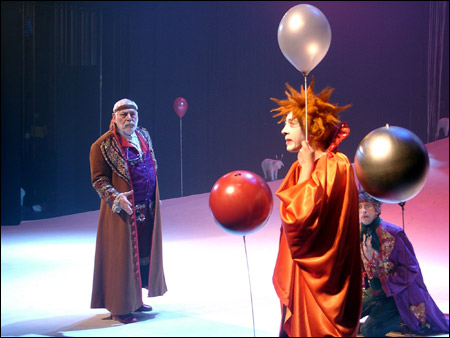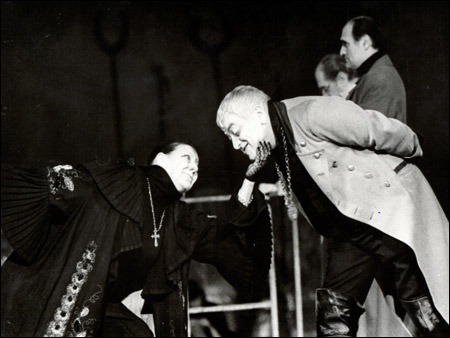|
|
 |
|
|
TWELFTH NIGHT |
|
In Europe, when we talk about theatre directors from the 20th century, we are most likely to be talking about Vsevolod Meyerhold, Bertolt Brecht, Aleksandr Tairov, Konstantin Marjanishvili, Aleksandr Akhmeteli, Giorgio Strehler, Peter Brook, Jerzy Grotowski, Peter Stein, Patrice Chereau, Eimuntas Nekrosius, Oskaras Korsunovas, among other prominent names. Georgian theatre director Robert Sturua (b. 1938) has played a significant role too. The students' movement of the 1960s changed 20th century culture. New cultural values emerged. The second half of the 20th century was full of key political, cultural and social events. The term Postmodern became one of the defining words in expressions of art. Hallmarks of Postmodernism like uncertainty, lack of clarity, fragmentariness, a mixing of genres, the element of the carnival in theatre -- found expression in Sturua's work.
Robert Sturua started working at the Rustaveli theatre in Tbilisi in 1962. He learnt directing for the theatre from Mikheil Tumanishvili, Lili Ioseliani and Dimitri Aleksishvili while in university. In 1964 he staged BEFORE SUPPER by Viktor Rozov and in 1965, THE TRIAL OF SALEM (original title: THE CRUCIBLE) by Arthur Miller. It was unanimously liked and was Sturua's first serious directorial work. Sturua appealed to Brecht's theatre, mastered it and connected it to the traditions of the Georgian theatre. His productions researched issues such as the individual versus the society, human freedom, and tyrannical states amongst others. His productions interpreted the work of Brecht, Ibsen, Beckett, Shakespeare and others in a new way.
He was not always successful but he never betrayed his beliefs. From Tsagaeli's KHANUMA onwards, he always tried to find and present new stylistic features in each of his productions and created his characteristic theatre language in the process. Robert Sturua works on the text and then proceeds to make it his own. Vsevold Meyerhold was first known to do this. Imagine a screenplay of a novel or a story. Sturua's method was similar. His own version of the text was then mounted on the stage. A montage was created. Creating a montage of a text was also done early in Georgian theatre by Kote Marjanishvili. This is now of course seen commonly in the work of directors across Europe. Another aspect of Sturua's method was that at times he did not stage all the actions and locations defined by the play's text, exemplified yet again in his production of Max Frisch's THE FIRE RAISERS at the premiere of the Rustaveli theatre season in 2009-10.
In the early sixties Sturua was also influenced by Mikheil Tumanishvili whose attempts to stage Shakespeare differently brought him criticism. Consciously or unconsciously, these stagings influenced Sturua's stylistics because the eclecticism, for which Tumanishvili was criticized mercilessly, is richly used by Robert Sturua in all his productions. Since the1980s avant-garde theorists have written about masquerade or the carnivalisation of public life, most notably under the influence of Mikhail Bakhtin. Shakespeare's phrase - "All the world's a stage" found new meaning as the idea of performance could be actually studied at various layers in a society - in politics, economics, culture and not just in artistic representations.
In my opinion, Robert Sturua's productions of Shakespeare's plays are remarkable for some of these reasons. Here I will refer to RICHARD III and TWELFTH NIGHT.
|
 |
|
|
RICHARD III |
|
In tune with his method, Sturua reconstructs the texts. In the case of RICHARD III some personages disappeared, new heroes appeared, the text was shortened, a new prosaic translation was done especially for this staging, new texts were added and a number of successive scenes from the original were merged. The tragedy of Richard the Third is presented to us in the form of a tragic farce. The director is leading us on to the human struggle for power but it is ironic and rationally observed. The appropriate stage design by Irakli Mshvelidze and music by Gia Kancheli enriched the production.
It must be said that Sturua gives music great importance in all his productions. Music becomes a defining aspect of Sturua's work. Costumes are also paid attention to. In RICHARD III, the military costumes remind us of people who in their times wielded absolute power such as Napoleon or the more paranoid Hitler. More contemporary connections with the historical text were made possible by playing with the text and it succeeds in underlining the moral bankruptcy and unabashed as well as ruthless ambition.
In his production of TWELFTH NIGHT, Robert Sturua uses various styles of performance such as liturgical drama, the miracle and the mystery plays, farce, pastoral, commedia dell' arte, slapstick comedy- they are all tied in one totality on the stage. The classical and the farce alternate with each other. Sturua also tries to show the Universe as terrestrial and real as well the metaphysical. It's an attempt to unite the visible and the invisible. Heroes of the play became the participants of tragic farce in the performance. Good humour, ironic implications, illusions, tricks, improvisation, etc. do not change the essence of events but on the contrary highlight them.
There is always a deeper philosophy at work in Sturua's production, as if the director wants to underline that there is nothing constant in our Universe. It is characteristic of Sturua's work to surprise his audience with the unexpected. In TWELFTH NIGHT he starts the performance with the birth of Jesus, which isn't in the original text and the viewer is equally shocked by the final episode that evokes the Calvary.
Robert Sturua's theatrical language which is definitive of the modern Georgian theatre is to typically use the 'film montage' as a method. Ideas are presented through the transformation of characters. The scenic space is mastered with mathematical precision and symbolism. Everything on the stage appears to be saturated with symbolic significance. One can witness the whole and the part, the fragmentary and the united. Actors don't follow any particular school of acting but are encouraged to bring about a confluence of the psychological with their own style. When a hero presents a monologue in Sturua's theatre, it is not just a monologue in the classic sense as we know it. Time isn't defined in Sturua's productions and there are no boundaries fixed between the real and the imagined. This is a theatre of multiple genres, always surprising and challenging.
Marina Vasadze is a theatre critic. She is the head of the Publishing house 'Kentavri' at the Shota Rustaveli State University in Tbilisi. She is also the editor of the newspaper 'Duruji' published by the University and is the founder and editor of the newspaper 'Culture' (Kultura).
|